IN FOCUS: Growing divisions between Thailand's establishment and youth-led movement
With divisions in Thailand between young people wanting change and those who see them as disruptive, In Focus analyses the cause of 2020’s political protests.
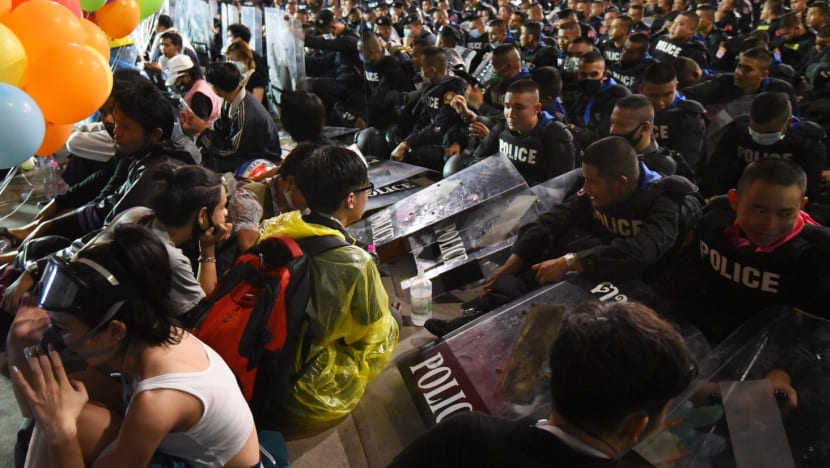
Protesters with police officers during an anti-government demonstration outside the House of Parliament in Bangkok on Nov 17, 2020.
BANGKOK: The roads outside the Grand Palace were lined with thousands of people in yellow shirts - the colour associated with the Thai monarchy and symbolically worn by royalists to show their loyalty.
Many of them were on their knees, holding portraits of King Maha Vajiralongkorn and shouting “long live the king” as their monarch walked through big crowds of supporters. With Queen Suthida by his side, the king waved and smiled as he greeted his subjects who had gathered on Oct 23 to get a glimpse of the royal couple.
With their entourage in tow, the pair made a brief stop in front of a man named Thitiwat Tanagaroon.
"He held up a placard among the protesters,” the queen told the king, as shown in a video clip posted on Thitiwat’s Facebook later. She was referring to a framed portrait of the late King Bhumibol and Queen Mother Sirikit that Thitiwat carried above his head at a student-led protest days earlier.
“Very brave, very brave, very good, very good, thank you,” the king praised the royalist in what would later become a viral video on Thai social media.
The clip marked a rare move by the king to reach out to the public as his power and revered status have been challenged by a series of protests since July.
Street protests organised by a youth-led group called Ratsadon have been resisting the authority and traditions of the establishment in Thailand.
While it started out as a movement demanding for the resignation of Prime Minister Prayut Chan-o-cha, charter amendments and monarchy reform, those calling for change have subsequently shifted their emphasis to the monarchy.
At the same time, those backing the royal family have also become more vocal and visible, bringing into focus the growing divisions within Thai society.
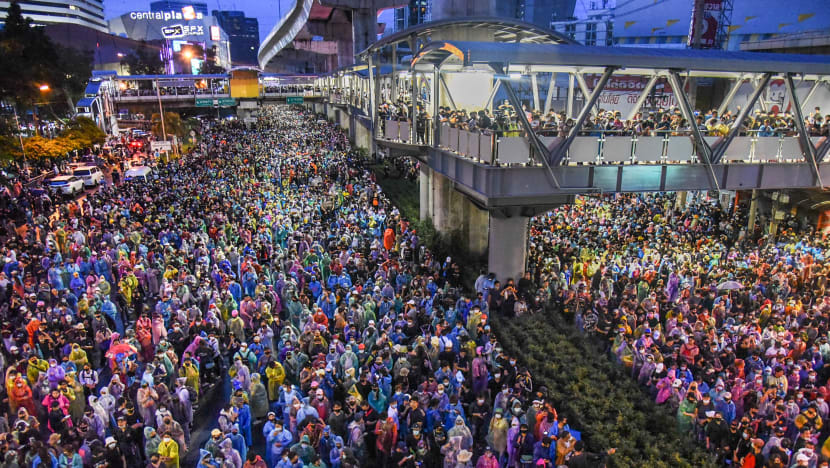
HOW IT ALL BEGAN
Months of street protests and calls for reform have been seen as an act of defiance against the old establishment in Thailand. They followed a major political development earlier this year, when the progressive Future Forward Party was dissolved.
Formed in 2018, Future Forward became popular among young voters. It took up a critical stance against the military, monopolies and the current constitution of 2017, which was written during Prayut’s military rule.
The party came in third in the 2019 general election with about 6.3 million votes before it was dissolved by the Constitutional Court on Feb 21 for breaching electoral laws.
The case involved a loan worth 191.2 million baht (US$6.3 million) that the party had accepted from party leader Thanathorn Juangroongruangkit to finance its political campaign.
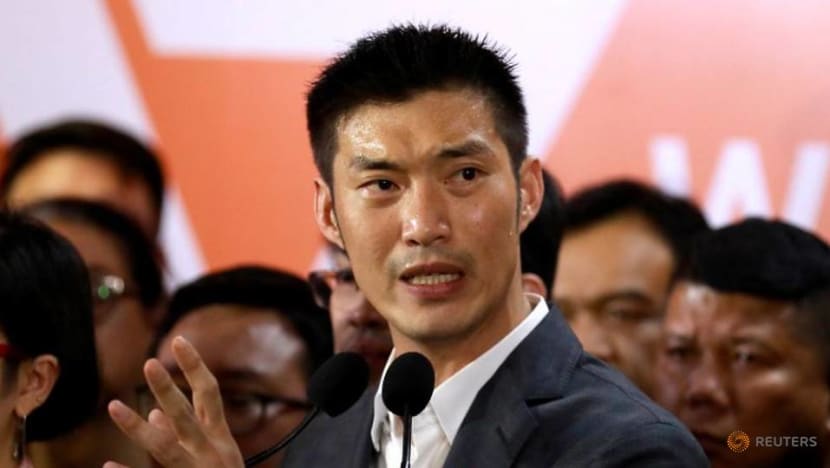
The court ruled that the source of the money was illegitimate, citing Section 72 of the 2017 Political Party Organic Law. The section prohibits political parties from receiving donated money, assets or other benefits with financial value when they know or are expected to know it was acquired illegally, or suspect it was obtained from an illegal source.
The court also determined that Future Forward had violated Section 66 of the law for taking a loan in excess of the limit of 10 million baht.
The ruling was seen by critics as politically motivated and led to student rallies in schools and universities across Thailand.
“I’d like to ask the public to respect the court’s ruling. I believe people who voted for the Future Forward Party will be able to find other mechanisms to inspect the government’s work,” Prayut wrote on his Facebook page on Feb 21 before deleting the post later that day.
During the height of the COVID-19 pandemic, student protests took a hiatus before re-emerging in July with louder calls for a new government and constitution.
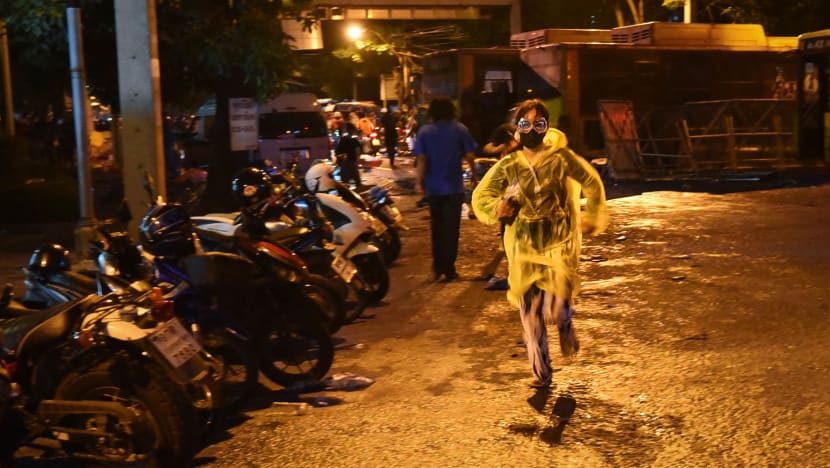
Young people formed a group that would later be known as Ratsadon and carried out coordinated demonstrations. They rallied for greater democracy and more equality in Thai society.
Protesters also began to draw connections between power players - from the government to the military, conservative elites, capitalists and the institution at the top of the social ladder – the monarchy.
They accused the monarchy of having links to previous military coups, raised objections to its share of the national budget and demanded an investigation into the king’s use of his powers during his stay in Germany.
RATSADON MOVEMENT EMERGES
Supporters of the Ratsadon group believe Thailand could change for the better. They want to shake up the social structure to decentralise power, reduce inequality and create more opportunities for ordinary Thais.
Ratsadon, which means "people" in the local language, is led by young Thais – those in their 20s and 30s or even younger.
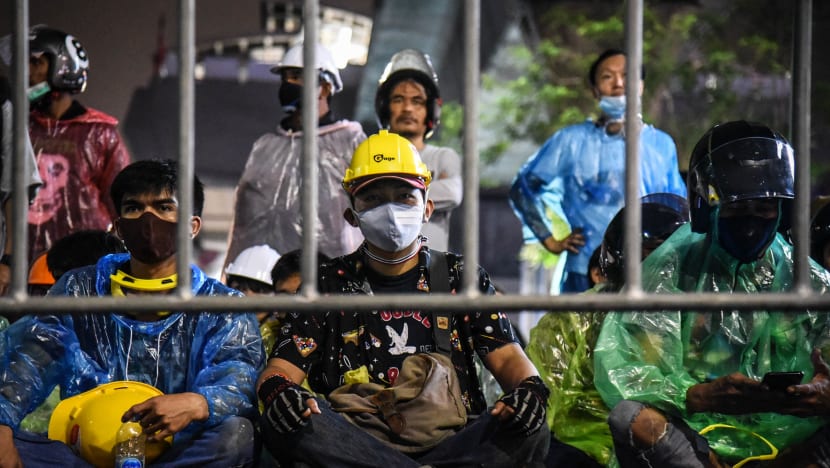
Their frustration and hope for a better future have sparked a national conversation about the establishment and how structural problems in the country could be solved by their three demands.
First, they want coup leader-turned-elected-prime minister Prayut to resign. Second, they want to amend the constitution, which was written during Prayut’s military rule by a military-appointed committee. Third, they want to reform the monarchy.
“People have come out because of these three demands, nothing else. They see the same problems and share the same ideology and goals. People have come out to support one another because everyone knows if they don’t, change will never come,” Panusaya "Rung" Sithijirawattanakul told CNA.
The 22-year-old is a key leader of the Ratsadon movement and a university student of sociology and anthropology in Bangkok.
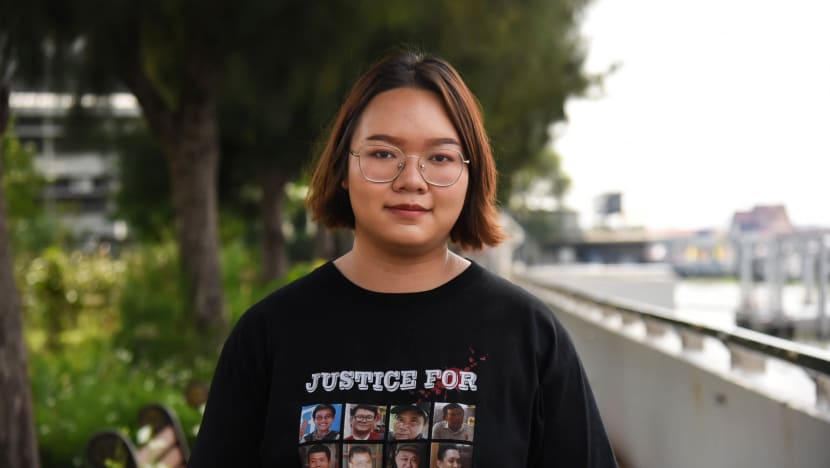
Rung made a name for herself in August by challenging the monarchy, widely seen as an untouchable pillar of Thai society. Standing on a stage in front of hundreds of anti-government protesters, she recited 10 requests for change within the monarchy. They included calls for transparency in its finances, accountability and revocation of the lese majeste law.
The requests were written by the United Front of Thammasat and Demonstration, a political youth group that has been at the forefront of Ratsadon’s campaign for reforms. Rung’s recital drew loud cheers and applause from the crowd.
“The root cause of structural problems in Thailand is a power group with excessive power, and that’s the monarchy. It has excessive power, so much so that it can interfere in other units and stay above the law without anyone daring to object,” Rung told CNA.
“This is because there are laws to suppress that, for instance, Article 112, which I’ve just been slapped with.”
READ: Thai protesters to pause for now and return next year
"A HUGE CULTURAL SHIFT"
Article 112 of the Criminal Code is also known as the lese majeste law – a legal mechanism designed to silence critics of the monarchy. It punishes whoever defames, insults or threatens the king, the queen, the heir-apparent or the regent with imprisonment of up to 15 years per count.
Still, the strict lese majeste law has not deterred hundreds of thousands of people from joining the political rallies led by Ratsadon.
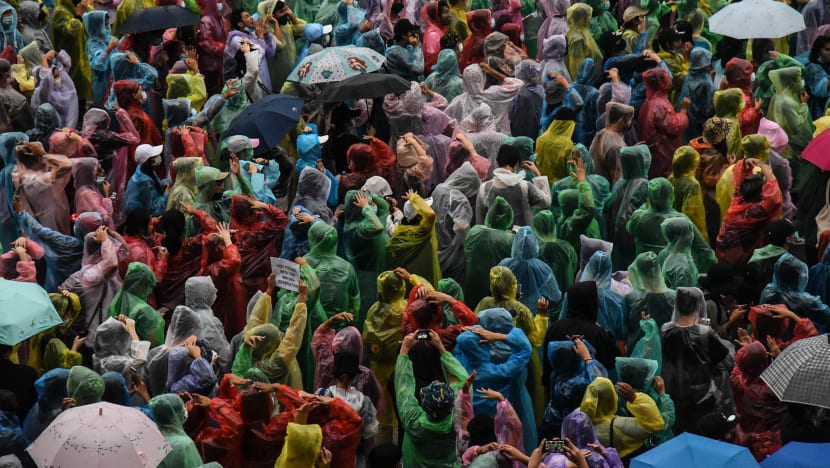
According to Tamara Loos, a professor of history and Thai studies at Cornell University, the Ratsadon movement is not just about the monarchy but rather “a huge cultural shift” from total obedience to the powers that be. Young people are questioning those in a position of power, she said, from state authorities to parents and teachers.
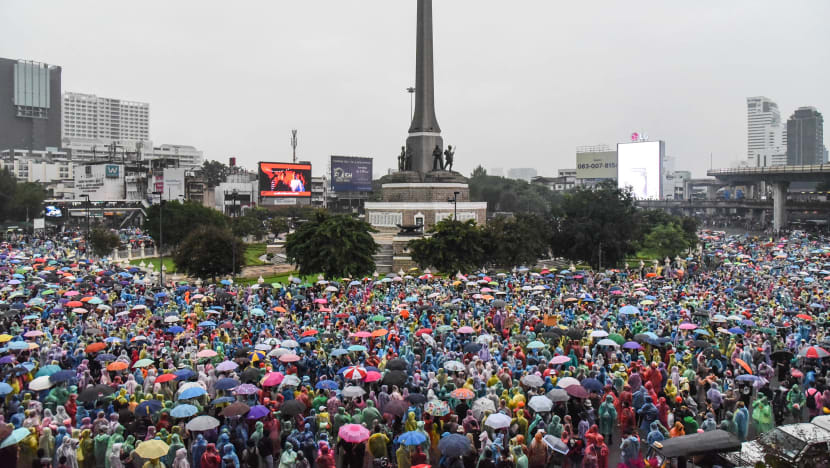
Apart from demonstrations on the streets, protesters have also tried going through the parliamentary channel to achieve their objectives.
More than 100,000 people signed their names to support a draft for charter amendments prepared by legal monitoring group iLaw. The proposals aim to give more power to the people to elect the prime minister and senators, while making it easier to amend the constitution.
Besides significant participation from the public, the draft was also regarded as a potential solution to months of protests. It was submitted to parliament in September before being rejected in a parliamentary vote two months later.
“Parliament has become a theatre of sorts. It’s no longer a space for representatives of the people. We’re disappointed by many representatives who didn’t safeguard democracy or take care of the people who voted for them as promised,” said political activist and civil rights lawyer Arnon Nampha after the parliamentary verdict on Nov 17.
“We dare say every single unit of the state is no longer free. The streets are now the stage for our fight,” Arnon added. “From now on, we’ll talk about Thailand’s structural problems head on.”
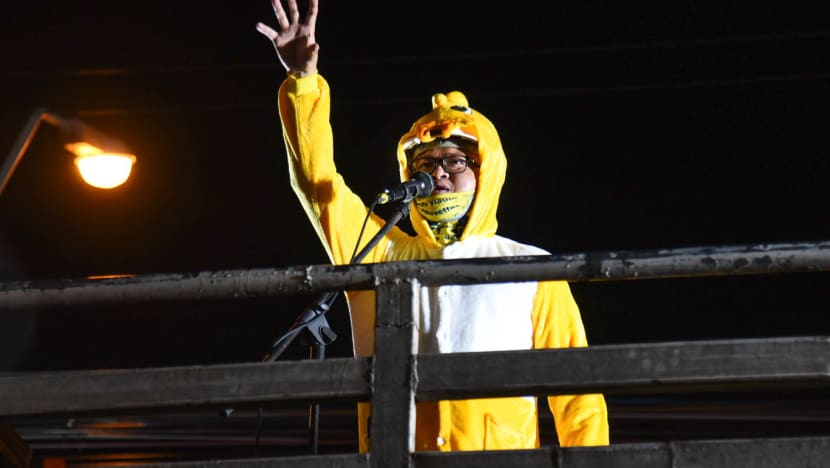
READ: The art of politics - Democracy protests inspire Thai creatives
"WE'RE HAPPY WITH THE MONARCHY": ROYALIST
While the protesters have called for reform of the monarchy, there is still widespread support and respect for the institution. It remains seen by many as a force for good, with the ability to unite the country and, when needed, bring calm and stability in moments of political turmoil. As such, the protesters’ demands are seen as contentious at best, and dangerous and disruptive at worst.
“Many issues they’ve raised are real problems and I think they’d gain acceptance if they addressed the actual problems," said Warong Dechgitvigrom, leader of royalist group Thai Pakdee.
"But their target is to overthrow the monarchy. They only complain about different problems for the sake of it, without being really serious. The target they’ve set goes above that.”
Thai Pakdee, which means "loyal Thai" in the local language, was set up in August with the aim of safeguarding the three pillars of Thai society – nation, religion and monarchy. The group mainly comprises the older generation, royalists and conservatives who support the 2017 constitution, the government and the prosecution of individuals who commit lese majeste.
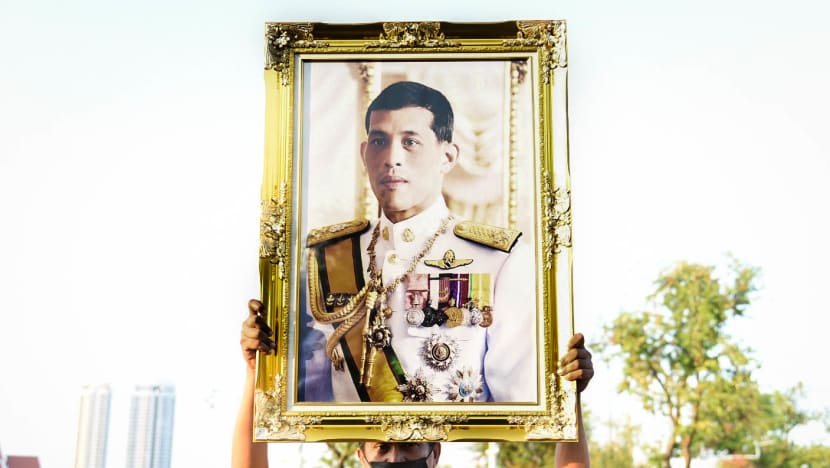
“We’re happy with the monarchy because it has done no harm to the people. Those who do the people harm and hurt the country are politicians. If you want to solve the problems, you have to work on the political structure. Fix it there,” Warong said.
Protesters’ calls for reforms have led to accusations that they are plotting to overthrow the monarchy and to establish a republic in Thailand. Activists have been criticised for involving the monarchy in politics and making disparaging remarks about the royal family.
Their pro-reform stance has also driven royalist supporters to rally in favour of the status quo. One of them is Yong Poonsri.
"They made me very sad. If they’re calling for political changes, we wouldn’t complain at all. But they are demanding change to the monarchy," she said. "There are millions of other people who love, revere and trust the institution.
“The way they do it is unfriendly. If you want to reform for the better, it has to feel amicable. Suggestions have to be made with principles and good reasons. But what we’re seeing is they make speeches on the stage, using offensive words – very rude. They also use different means to accuse and slander,” added Warong from Thai Pakdee.
He is adamant the youth-led movement wants an end to the Thai monarchy. Although change in the government system is not part of Ratsadon’s key demands, it is not uncommon to see young demonstrators holding up placards with messages about a revolution or a republic.
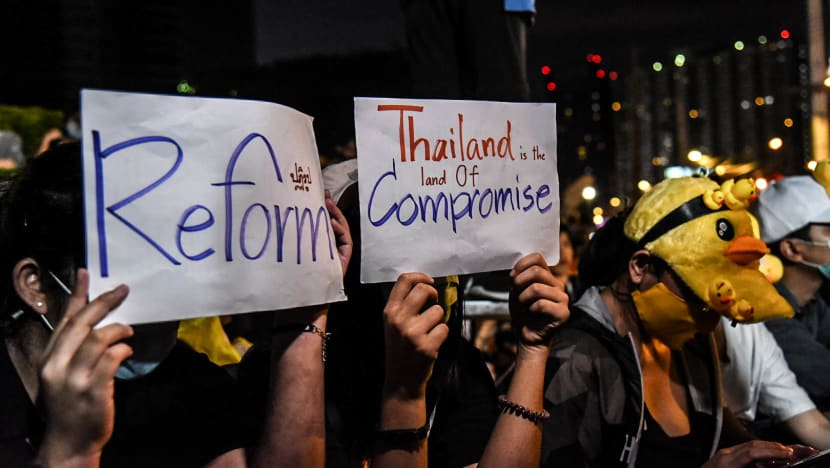
The name Ratsadon itself is a symbolic reference to a group of revolutionaries behind Thailand’s transition in 1932 from absolute monarchy to constitutional monarchy. Protest leaders say what they want is for the monarchy to truly remain under the constitution and away from politics.
“We came out with suggestions for reform. Reform means to develop, to change, not to abolish,” Rung said.
If we said we didn’t want the monarchy, that’d be abolish. What we’ve been saying all this time, though, is we want the king to remain but can you adjust a little so that we can co-exist in society?
"WE HAVE TO HELP PEOPLE SEE WHAT IS WRONG": KING MAHA
The Ratsadon movement is pressing on with its three demands. But the royalists are also increasingly taking to the streets.
Their move coincides with the royal family making more public appearances to engage the people. At some of these events in the past months, royalist supporters took selfies with the monarch, asked for his autograph and held his hands. The intimacy brought joy to many royalists because this type of closeness to the public had not been seen since his ascension to the throne four years ago.
During his public appearances, the king thanked his supporters for their loyalty and occasionally guided them on what to do.
“We have to oppose what is not right. We have to help people see what is wrong, what is not good, what is distorted and what is fake news,” he told Warong during his public greeting at the Lumpini Park on Nov 25.
His message was short but carried significant implications. Critics see it as the king’s endorsement for royalists to counter criticisms against the monarchy and at the same time, reflects his rebuttal of Ratsadon’s demand for monarchy reform.
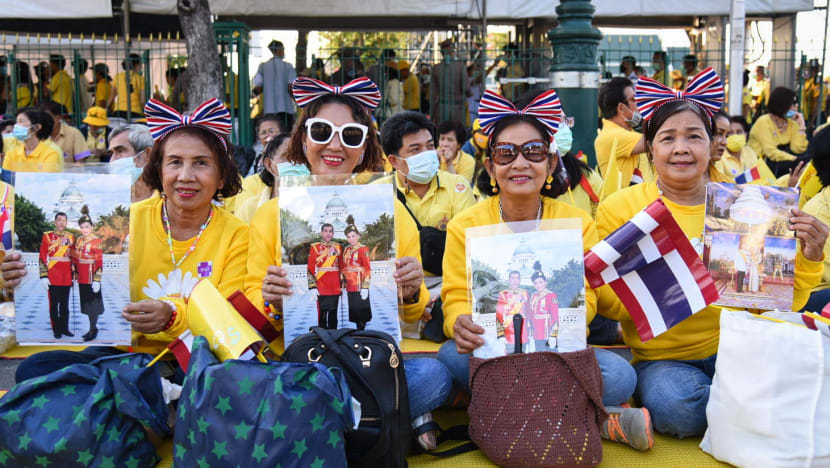
Frequent public appearances by the king and queen and their interactions with people have led supporters to believe the monarchy’s popularity is growing.
According to Warong, these appearances are proof that the institution is adjusting itself to modern times and shrinking the distance between the monarchy and the people. The royalist believes many Thais love and respect the king, and that when they see how he has been “bullied” by the protesters, it makes them feel more strongly towards the monarchy.
“I think the opposite side is worried – the protesters – because they don’t think the king would adjust himself to be loved and worshipped by the people,” Warong said.
“His reign has only begun recently. So, it’s normal for the king to visit his people. I even dream that he’d visit people in districts and villages. Now is just the beginning.”
READ: Thousands pay tribute to Thai royals amid calls for reform
WEALTH AND POWER AS A DIVISIVE ISSUE
Before a military coup in 2014, Thailand was ruled by a civil government under the constitution of 2007. When then army chief Prayut seized power, the constitution was cancelled and later replaced with a new one. The committee that drafted it was appointed by the junta.
The new constitution won the majority vote in a national referendum. But when the government submitted it for royal endorsement, it was informed by the palace that the king wished to alter some content regarding prerogative powers.
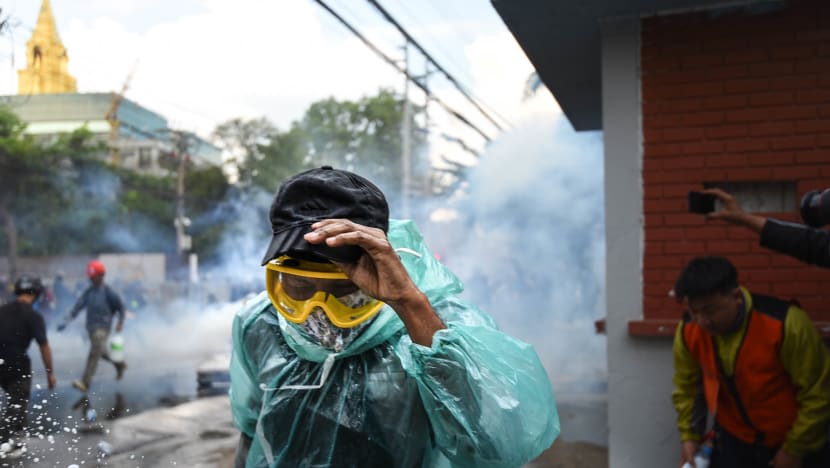
“There was a royal remark that three to four parts related to prerogative powers need changing. However, this has nothing to do with the rights and freedom of the people, not at all. It’s about His Majesty’s prerogative powers,” Prayut said in a press conference at the Government House on Jan 10, 2017.
The amendments have enabled the king to rule Thailand despite his absence from the country or inability to perform his functions, without having to appoint a person or council as regent.
More changes were made subsequently, including the amendment of the Crown Property Act in 2017. The new law granted the king full control of royal assets. These include the crown property belonging to the monarchy as an institution and royal assets previously regarded as public property, such as palaces and the famous Temple of the Emerald Buddha.
READ: Thai protesters call on king to give up royal fortune
In 2018, the Crown Property Bureau, which manages the royal fortune on behalf of the monarchy, announced that "all Crown Property Assets are to be transferred and reverted to the ownership of His Majesty, so that they may be administered and managed at His Majesty’s discretion".
According to the statement, this applied to shares in various companies such as Siam Commercial Bank and Siam Cement. The companies’ latest records show that the king is now their biggest shareholder, with 799,792,359 shares (23.53 per cent) in the bank and 403,647,840 (33.64 per cent) shares in the industrial conglomerate.
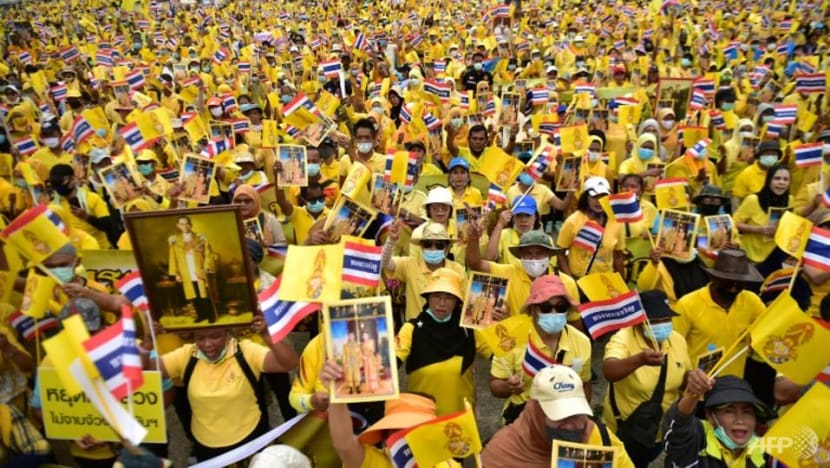
For royalist supporters, the king merely took back what is rightfully his.
“There were accusations about the Crown Property Bureau and attempts to make it look like the king has stolen what belongs to the state. In fact, the Crown Property Bureau originated from the fortune of his lineage,” Warong said.
The protesters hold a different view. For them, the legal changes and transfers of royal assets reflect an excessive use of power. They are also critical of the annual national budget, which sets aside money for the monarchy.
An earlier report by local media, citing data from the budget bureau under the prime minister’s office, noted that allocations worth more than 29 billion baht were set aside for the monarchy in the national budget Bill of 2020. These included a budget of 13 million baht for the Department of International Trade Promotion to exhibit fashion products of the king’s daughter, Princess Sirivannavari Nariratana, in foreign countries.
ABNORMAL POLITICS, MILITARY COUPS AND STUDENT UPRISINGS
Tension has continued to build as protesters push ahead with their demands. They have faced dispersal operations by police, who have deployed tear gas and water cannon, and many people have been arrested and charged.
For now, the protestors have indicated that they “will rest” until next year, but the movement has shown no signs of stopping.
According to Prajak Kongkirati, a political scientist and lecturer at Thammasat University in Bangkok, if Prayut had not staged a coup in 2014, Thailand would not have the youth-led movement today.
“In a country where politics is very abnormal, very authoritarian, there will be a student movement. If politics is normal, other mechanisms will function. For example, the election will deliver, the parliament will see a counterbalance between the ruling party and the opposition, and interest groups will be able to proceed,” he said.
“If the country has freedom and the politics is good, students will carry on with their duty – study – because politicians and other groups will run politics.”
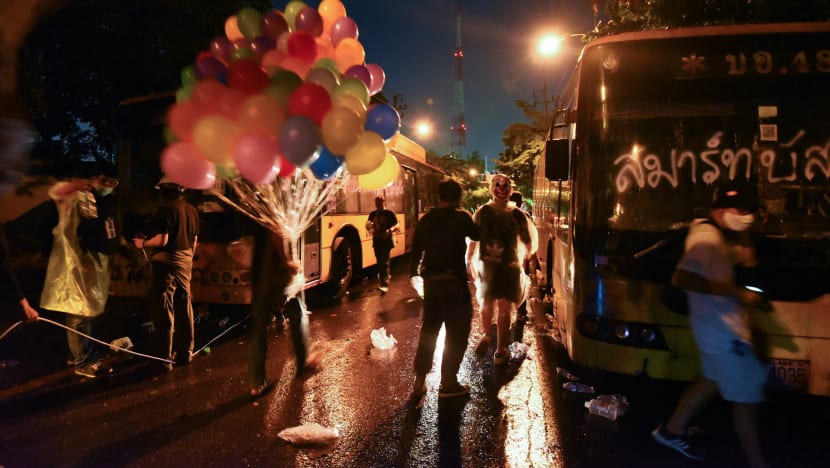
However, many young Thais grew up amid political turmoil and street protests that led to violence. They also witnessed two coups only eight years apart – the first in 2006 and another later in 2014 – and two democratically elected governments being overthrown.
Prajak noted that the current prime minister was a coup leader who put Thailand under military dictatorship for five years, before an election installed his political party to government.
“This is abnormal politics, where the military still has power to interfere,” he told CNA.
“It’s this political abnormality that has created political consciousness for these students, nothing else. They questioned why their country is like this – trapped in a cycle of coups, ruled by the military and lagging behind other nations.”
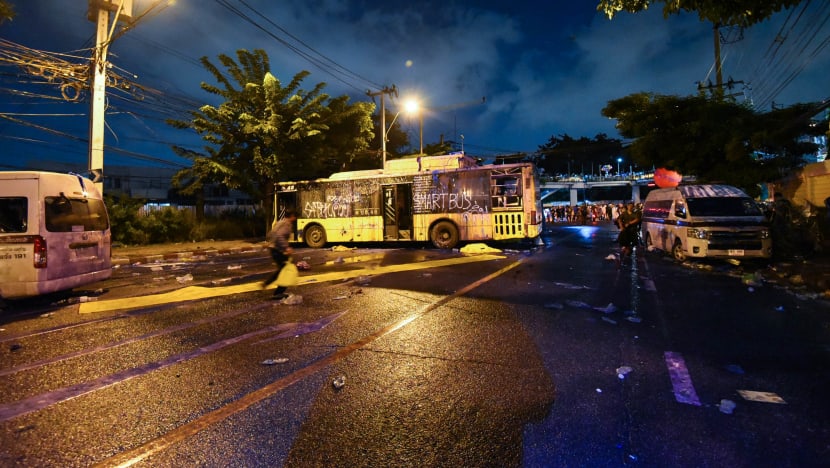
WATCH: Impact of Thai protests on its immediate neighbouring countries
GOVERNMENT DEFENDS USE OF LESE MAJESTE LAW
A large number of protesters have been arrested and charged for various crimes since October, including charges of sedition and offences under the Computer Crime Act. Between Oct 13 and Oct 22, 77 arrests were carried out by police. Out of this, 54 were related to violation of the emergency decree, according to Metropolitan Police Bureau's deputy commissioner Piya Tawichai.
In November, however, protest leaders faced charges of lese majeste over their remarks at demonstrations. This marked a shift in the approach taken by the authorities.
In June, Prayut said the law had not been used because it was the king’s wish. However, he later issued a statement on Nov 19, saying it is now “necessary” for the government and security agencies to enforce all the pertaining laws against protesters who violate the law or infringe upon the rights and freedom of others.
“Currently, tensions have not sufficiently abated and may develop into a conflict, possibly by involving acts of violence. If this trend continues, it will further damage our country and Thailand's revered institution, as well as risk public safety, including the personal property of many citizens,” said the prime minister.
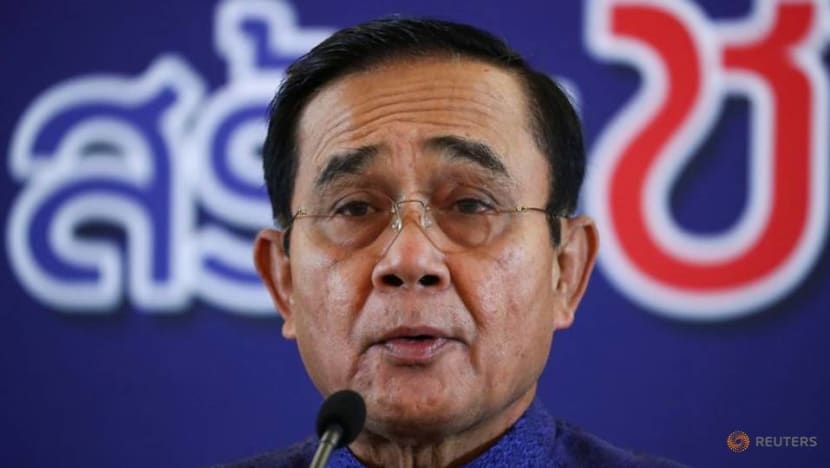
As of Dec 18, 35 protesters had been charged for lese majeste. These include one minor and several university students such as Rung.
The prosecution prompted the United Nations High Commissioner for Human Rights to issue a statement asking the Thai government to “stop the repeated use of such serious criminal charges against individuals for exercising their rights to freedom of expression and peaceful assembly”.
“It is extremely disappointing that after a period of two years without any cases, we are suddenly witnessing a large number of cases, and – shockingly – now also against a minor,” said its spokesperson Ravina Shamdasani.
“People should be able to exercise these rights without fear of reprisals. The UN Human Rights Committee has found that detention of individuals solely for exercising the right to freedom of expression or other human rights constitutes arbitrary arrest or detention,” she added.
In response, the Thai Ministry of Foreign Affairs explained the lese majeste law is not aimed at curbing people’s right to freedom of expression or debates about the monarchy as an institution.
Its spokesperson Tanee Sangrat said on Nov 19 the law exists in Thailand to protect the rights and reputation of the king, the queen, the heir-apparent and the regent the same way that libel law does for any Thai citizen.
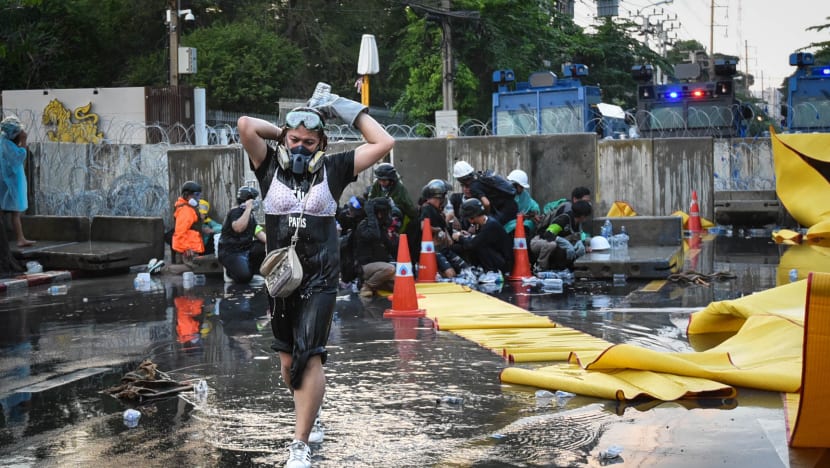
For the likes of Rung, legal prosecution will not be able to silence Ratsadon. People may feel tired but she does not believe they will desert the movement until the three goals are achieved.
"Even though I’ve just been charged with Article 112, I have no regrets,” she said. “This is part of a social movement. This is part of a social change for the better. So, I’m willing to accept it.”












